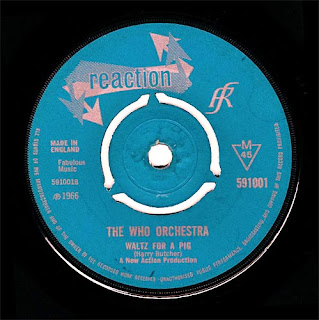

The George Martin Orchestra - All Quiet On The Mersey Front (George Martin) Parlophone R 5222 - 1965
Chris Lamb & The Universals - Mysterious Land (Chris Lamb) Decca F 12176 - 1965
Las brumas de otra década se disipan estoicas, y bailan al son de melodías nocturnas y antiguas. Los extremos se tocan, como siempre, y como siempre nos dicen ténuemente que el viejo espejismo sigue candente, y olvidado por lo presente. Algunos reunen fuerzas para lanzar deseos al viento. Deseos de tierras misteriosas en el ropero y en la salita de estar.
Tranquilo, camarada extraño. Todo está tranquilo en el frente de nuestras viejas guerras, y otras paces humeantes se acercan suaves e insolentes. Salud y gloria a los corredores de fondo y a los degustadores secretos de canciones escondidas.
------------------------------------------------------------------
The mists of another decade are stoically dissipating, and dance to the sounds of nocturnal ancient melodies. Extremes are touching each other, as usual, and as usual they're faintly telling us that the old mirage keeps on burning, and forgotten for being present. Some gather strengths to cast desires into the winds. Desires of mysterious lands in the wardrobe and in the living room.
Be calm, strange comrade. All is quiet on our old wars front, and some other smokey peaces are approaching smooth and insolent. Glory and greetings to the long race runners and to the secret tasters of hidden songs.
http://rapidshare.com/files/328475484/George_Martin_Orch_-_All_Quiet_On_The_Mersey_Front.mp3
Tranquilo, camarada extraño. Todo está tranquilo en el frente de nuestras viejas guerras, y otras paces humeantes se acercan suaves e insolentes. Salud y gloria a los corredores de fondo y a los degustadores secretos de canciones escondidas.
------------------------------------------------------------------
The mists of another decade are stoically dissipating, and dance to the sounds of nocturnal ancient melodies. Extremes are touching each other, as usual, and as usual they're faintly telling us that the old mirage keeps on burning, and forgotten for being present. Some gather strengths to cast desires into the winds. Desires of mysterious lands in the wardrobe and in the living room.
Be calm, strange comrade. All is quiet on our old wars front, and some other smokey peaces are approaching smooth and insolent. Glory and greetings to the long race runners and to the secret tasters of hidden songs.
http://rapidshare.com/files/328475484/George_Martin_Orch_-_All_Quiet_On_The_Mersey_Front.mp3
.








.jpg)


.jpg)
















.jpg)



.jpg)
.jpg)

+-+Waltz+For+A+Pig.jpg)












